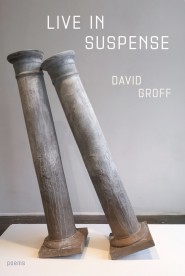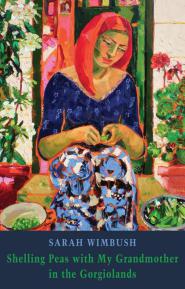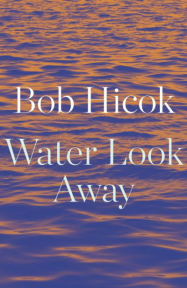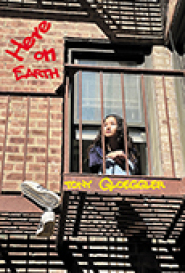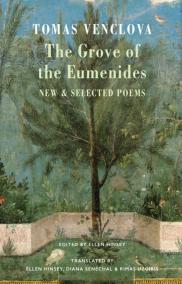
David Groff, Live in Suspense,
Trio House Press, Inc., 2023.
ISBN: 978-1-949487-15-2. 208pp. $18.00.
Wrestling
with exquisite uncertainties,
David Groff brings a lyrical imagination to the great existential challenges he faces (that we all must face): love, death, God. As he begins his poem, “Snow
Melting”:
Here my mission starts,
not in that harsh quilt
but in my seepage,
my diffusive
self
Hard to get a grip on one’s sense of self, let alone loss and
all that goes with it – the grief, the relief, the coming to terms with reality – the poem, in which Groff imagines metaphorically embracing somebody’s coffin (mother, father, lover?), as a sort of
comforting gesture, ends with the prayer-like invocation,
let me like you be snowmelt
let us be the disappearing
into the disappearing.
The final poem, “The World
Without Me,” imagines that very disappeared world, in which, say, a tree falls in a forest and nobody hears it. (“Someone remembers me for an instant / and their phone trembles with a message.”) The
bliss of oblivion.
In between, precisely because of the uncertainties, we live in
a state of suspense. This lasts until we die. As he writes in the eponymous poem:
Every risk is a rehearsal.
We know what chance does.
We know what death does,
will do, has to do.
It’s a line he repeats in a later
poem, “Nights of 2027,” in which he considers his husband Clay’s HIV, which “insinuates him into swifter aging,” summing up their life: “Every risk is a rehearsal.” As he further reflects about this
essential state of suspense: “We won’t exactly expect / the exits abrupt or extended.”
The son of a Christian minister, religious themes recur
throughout Groff’s poetry. Three poems, all titled “A Boy’s Own Bible Story,” like something out of one of those wholesome magazines, often found in dentists’ offices, aimed at Christian
teenagers, re-imagine scriptural passages, two from Genesis (Noah and the Flood, with God imagined as an omnipotent Weatherman, Abraham’s sacrifice of Isaac, with God imagined as “the boss”), one
from Luke (Lazarus rising from the dead). Two other poems, “A Boy’s Own Jesus,” in which he imagines Jesus as “The older brother I never had, / the one who knew the way / to the bathroom in the
dark,” and “A Boy’s Own Heaven,” “the cheery not-right-now right place / belied by the crying widow,” complete this ironic theme of naive wonder (and the understated cynicism that goes with
it).
The poem, “Chaff,” spells out
Groff’s essential skepticism, though tempered with the moral myths absorbed as a child:
On this scorching seventh day at 10
God harvests the town and scatters
us unbelievers to our Sunday funk:
my heart rate monitor ticking my pace,
I am the blackbird seeking glean,
Magdalene the streetwalker.
Indeed, Groff is haunted by the deaths of his parents and so
many friends and lovers from the AIDS epidemic of the late 20th century. “Prodigal,” “I’m Here to Help,” “Hit the Road, Jack,” “What Else,” and “His Corpse” all chronicle his father’s death, all of
them implicit with guilt . As his father lies in a Los Angeles hospital bed, “like a deadbeat dad I kiss my father and flee,” Groff writes in “Hit the Road, Jack,” about sitting vigil. His father
dies alone, unattended, and Groff’s guilt is painfully on display in the opening lines of “What Else”:
What else can you demand of me?
Bloody knees on the anniversary
of the day you died unseen in your
sleep?
His mother’s death is no less
fraught. “Malcah,” “Little Invocation,” “All the Nights” (“Now she has died and cannot be thanked”) are all saturated with Groff’s feelings of guilt – and grief. “Come home to me, grief,” he
writes in “Grievance,” “don’t leave me to savor the rest of my days.” But he still finds comfort in her memory. “Like a Simile” begins:
My dead mother sneaks up on me
when I don’t know I need
her.
The scourge of AIDS has left a
scar, too. Five poems beginning “Days of” (1980, 1985, 1986, 1992, 1996) recount deaths from HIV infections. “Days of 1992” tells the story of a casual encounter in a hot tub with a man on Fire
Island named William Smith, a name so common it’s now impossible to know his fate for sure, though his bruised eyes were ominous.
His name is too common to Google,
that tool and term and world
he wouldn’t know.
And God? The man behind the man who runs the soft machine?
I cannot choose to choose.
I asked and ask what prayer, what help
we two could give to a God,
if he is, does what he deigns, it seems,
without our asks, who grabs the wheel
and blows through every intersection.
Live in
Suspense is an eloquent and
often heartbreaking poetic interpretation of existentialist angst that Soren Kierkegaard might have read nodding his head in agreement from start to end.
Charles Rammelkamp
To order this book click here
Charles Rammelkamp is Prose Editor for BrickHouse Books in Baltimore, where he lives, and edits The Potomac, an online literary journal. http://thepotomacjournal.com. His photographs, poetry and fiction have appeared in many literary journals. His latest book is a collection of poems called Mata Hari: Eye of the Day (Apprentice House, Loyola University), and another poetry collection, American Zeitgeist, is forthcoming from Apprentice House.
Sarah Wimbush
Shelling Peas with my Grandmother in the Gorgiolands
Bloodaxe, 2022. ISBN 978-1-78037-616-5. 78pp. £10.99.
Like her very own ‘powder monkey’, Wimbush exploded on the poetry scene with her debut pamphlet Bloodlines, published by Seren three years ago, having won the Mslexia/PBS Poetry Pamphlet competition in 2019. The following year saw a second pamphlet with Smith|Doorstep, and another collection, responding to the Miners’ Strike of the 1980s, is brewing. It’s great to see Bloodaxe honouring another northern woman poet, whose Yorkshire and Romany heritage rings true on every page of Shelling Peas.
The long list of acknowledgments is testament to success rooted in well-crafted and carefully shaped poems, ranging from the epistolary prose poem form of ‘Blood Sugar’, to the deft slant rhymes that punctuate ‘John Thomas’
(… He is the son
of the fatha who lost the plot, brought to roam wi nowt
but a hip-flask n compass in his hedge-mumper pocket)
which like ‘Meat Puddin’ includes phrases in dialect (words from the Romany lexicon are throughout translated in footnotes). Wimbush does not shy away from conventional forms – ‘Our Jud’ is a thoughtfully worked sonnet, making use of the anaphora ‘and’ which adds an urgency to the pace which is kept in line by the use of full stops at the end of each line:
And sang like an angel and played grass like a tin whistle.
And rarely missed a fisticuffing down the Old Blue Bell.
‘William Shaw is Lowered down the shaft’ uses the form of the villanelle to devastating effect:
‘the pit mouth begins to evanesce,
my lungs tightening balloons.
The water below has its own devices –
I stretch, I reach out into darkness.
Wimbush is passionate about language, and the need to preserve the vernacular: ‘Our Language’ insists ‘This is the voice…this is the tune of the haulage boys and shot-firers and Elvis impersonators, their legs smashed to bits at the bottom of shafts and the women who feed everyone’s children.’
Repeated motifs or characters hold the collection together, despite the disparate voices: the ‘Powder Monkey’ Apprentice’ (a person in charge of explosives in a mine) resurfaces in ‘STOP!’ and the discussion of ‘dukkering’ in ‘Mother Tongue’ leads seamlessly to the poem ‘Dukkering’. This creates a sense of an integrative community which has shaped Wimbush, whose roots in, and affection for, South Yorkshire shine through. A powerful and engaging collection, and we await her next collection with eager anticipation.
Hannah Stone
To order this book click here
Hannah Stone is the author of Lodestone (Stairwell Books, 2016), Missing Miles (Indigo Dream Publishing, 2017), Swn y Morloi (Maytree Press, 2019) and several collaborations, including Fit to Bust with Pamela Scobie (Runcible Spoon, 2020). She convenes the poets/composers forum for Leeds Lieder, curates Nowt but Verse for Leeds Library, is poet-theologian in Virtual Residence for Leeds Church Institute and editor of the literary journal Dream Catcher. Contact her on hannahstone14@hotmail.com for readings, workshops or book purchases.
Bob Hicok, Water Look Away,
Copper Canyon Press, 2023.
ISBN: 978-1556596506. 112pp. $18.00.
The first poem in Bob Hicok’s new
collection, with the ironic title, “Welcome Home,” establishes the drama at the center of this heart-wrenching sequence. A man comes home to find his wife has hanged herself. The poem, its
punctuation, reads like a series of freeze frames, which underscores the man’s shock and disbelief. There’s guilt, too, implicit in his recognition that the hole through which she threaded the
extension cord with which she hanged herself was one he had bored. But there’s also confusion and even a kind of anger. “Surprised it. Wasn’t / him and. Jealous she got. / There first.”
Several poems later, in “Birds of a Feather,” we read “that some days he could not get out of bed / for years.”
After the stark discovery of his dead wife, the rest of the
book swings through the memories and emotional responses, the doubts and questions. We read about their meeting in “The Arrival,” a casual evening of drinks with friends. She is like an oasis in the
desert of the predictably tedious social encounter. “With everyone else at the table / in a race to kill silence, their hush / a copse.” More than simple relief, the encounter is inspiring. The
poem ends:
How do you translate eyes,
a problem no language
has solved: looking at her
was like hearing a coyote
at night. He woke up.
There’s the marriage. Two of the poems, “Marriage” and “Now We’re Not Getting Somewhere,” bitter and forlorn in tone, play on wedding vows. The first, more anguished, more sincere, reads:
Do you take
(no
give.) Do
you give
(no
hold.) Do
you hold
(no
river.) Do
you river
(yes I river
this man/woman
into/as
my breath.)
It’s as if they really had been “one.” While this first poem occurs early in the sequence and pulsates with his raw grief, the second comes toward the end and feels
more resigned, as if having cycled through Kübler-Ross’s stages of grief, to arrive at a bleak “acceptance.” The poem ends:
Do you take this man/woman
to be your lawfully wedded accident
to not flee the scene of?
I did/I shouldn’t have/I would
again, again.
And coming full circle, in one of
the final poems, “A Recipe,” which begins, “He was she was they was knife,” again highlighting their oneness of soul, Hicok reduces the marriage to its essential
formula:
Once a man who sometimes wanted to kill himself
loved a woman who sometimes wanted to
live.
Indeed, the poems are all about analyzing the survivor’s response, beginning with titles like “Diagnosis” and “Writer, Heal Thyself,” and questioning the woman’s state of mind for clues, through her miscarriages and an affair (“The New Tense,” “Knowing,” “Apology as Promises (His),” “An Accounting”). All of this speculation is filled with the understanding that it’s impossible to know anything for certain. Two spectral characters, Anna and Stephanie, recur (“The Meet-Cute (Actual, with Redaction),” “Stephanie,” “Now We’re Not Getting Somewhere”). The wife and her lover?
In “What from the Outside Seems Whim from the Inside Goes by Avalanche,” the man painstakingly goes through his wife’s final actions and thoughts leading up to her suicide, comparing her to a cat, idly speculating about the mental processes that lead to a decision. “How do cats make up their minds?” He takes her movements back to “before before before she killed herself” (she did the dishes) and “before before” (she talked to a friend on the phone) and finally to “before,” when she watered the plants, seeking some kind of elusive meaning. Another poem asks, “Did She Leave a Suicide Image?”
“Apology as Burial (Hers)”
distils the relationship to its essential conundrum: “to bury alive / how I killed you to get even with you needing me / to need you too much.”
Hindsight is always twenty-twenty, as they say, but were the
clues always there? In “Wealth” we read: “She couldn’t survive / without the option / to not,” and the reverie called “The Long Wish” ends: “Do you too / get tired of yourself?” In “Two Steps
Forward, One Off a Cliff,” while sifting through and destroying love letters:
A suicide note slipped among his, a draft:
“I am tired of asking existence to notice
how much I worry about its shape and breath,”
everything crossed out except “I am tired.”
It’s hard to know what resolution
to the angst and uncertainty, if any, Hicok arrives at, a la Kübler-Ross, but the
speculation is profound and compelling, the poetry like an ouroboros, a snake biting its tail in a symbol of the infinity of the cycle of birth and death. Perhaps the key to the collection is
found in the poem, “Holding Breaking Close,” from which the book’s title comes, in which he speculates:
and wouldn’t it be great to ask water
if leaving felt the same to it
as coming home, since it was always
doing both, and have water look away
and think for a hundred years
before answering.
Charles Rammelkamp
To order this book click here
Charles Rammelkamp is Prose Editor for BrickHouse Books in Baltimore, where he lives, and edits The Potomac, an online literary journal. http://thepotomacjournal.com. His photographs, poetry and fiction have appeared in many literary journals. His latest book is a collection of poems called Mata Hari: Eye of the Day (Apprentice House, Loyola University), and another poetry collection, American Zeitgeist, is forthcoming from Apprentice House.
